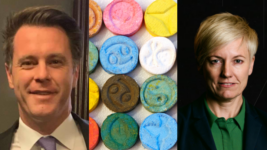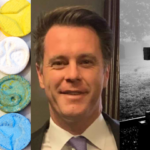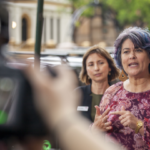Despite Pill Testing Bill, Minns Condemns Festivalgoers to a Summer of Drugtaking Blind

NSW Greens MLC Cate Faehrmann introduced pill testing legislation into state parliament last week, in an effort to save the lives of people who die regularly in drug-related circumstances, because while drugs like MDMA are illegal, they’re available on the black market without any quality control.
Both major parties and the NSW police are well aware that they cannot end the supply of illicit substances, having had a century to do so, and the fact that people have a good time using these substances and most of the time they don’t kill, means that people will continue to take these drugs.
Since 2015, successive Coalition governments had knocked back calls for the trialling of this technique which reduces harms. And despite promises of drug law reform prior to taking office in March, Labor premier Chris Minns has since shown himself to be a shrinking violet on the issue.
Indeed, NSW major party dinosaurs have been so resistant to this evidence-based intervention for so long that a population living within a territory, the ACT, which is completely surrounded by our jurisdiction, have now been able to access fixed-site pill testing for a year and a half.
In the ACT, Labor health minister Rachel Stephen-Smith announced the trialling of fixed-site drug checking. And of the 1,000-odd samples tested over its first year, 10 percent of those drugs were voluntarily disposed of, clearly evidencing the reduction in drugtaking that pill testing results in.
Yet, in NSW, Liberal premiers Mike Baird and Gladys Berejiklian and Labor leader Chris Minns have preferred to frame those advocating for such reform as extreme, when what is an excessive stance is to condemn youths who take illegal drugs to do so blindly and at times at the expense of their lives.
Preventable deaths
“Four years ago now, six young people died after attending music festivals in NSW,” said Faehrmann in her second reading speech. “Nathan Tran, Diana Nguyen, Joseph Pham, Callum Brosnan, Joshua Tam and Alex Ross-King died from drug overdoses”, over the 13 months to January 2019.
In response to the 2018 deaths of Nguyen and Pham, which sparked the usual calls for pill testing, then premier Berejiklian convened a panel to consider how to prevent such fatalities yet specified no consideration of pill testing. And she then attempted to shut down the entire festival industry.
Over the year to December 2015, six young people died in drug-related circumstances at festivals nationwide, and five of these fatalities occurred at events in this state. This led to a campaign on the part of drug law reform experts and the NSW Greens calling on premier Baird to roll out pill testing.
This simply led to Baird and NSW police minister Troy Grant shooting down the idea repeatedly, despite the fact that a number of European nations have allowed the testing of illicit drugs as a service to civilians, which ultimately results in less drugs being taken, since the early to mid-1990s.
Part of the 2015 calls for pill testing in this state, Unharm launched a new campaign in September this year calling on March-elected Minns to roll out pill testing. But the premier, like his Liberal predecessors, rejected the calls that were backed by an open letter with 20 esteemed signatories.
Rather Minns said in response that “the truth is there’s no safe quantity to take of these illegal substances.” And frankly, this type of “just say no” approach to drugs doesn’t prevent their use and the assertion that it does died long before its key proponent former US first lady Nancy Reagan did.
And in a manner that almost felt predictable, as the October long weekend got underway and early summer festivals commenced across the city, two young men, a 26-year-old and a 21-year-old, died in drug-related circumstances out west.
A tried and tested approach
“It is difficult to properly explain the potential risks to young people if our only permissible message is ‘just say no’,” wrote NSW deputy state coroner Harriet Grahame in her 2019 findings. And she added that we need to change the focus from reducing drugtaking to reducing drug deaths.
Faehrmann pointed to the coroner’s recommendations on introducing her Pill Testing Trial Bill 2023 on 29 November. She explained that Grahame’s assertions were echoed by the head of the ice inquiry Dan Howard, who said there was “compelling evidence to support substance testing”.
The Greens pill testing bill creates a standalone Act that provides for a licensing scheme which would permit suitable applicants assessed by NSW Health to provide drug checking services either via a fixed-site or mobile pill testing licence.
Section 26 of the proposed Act ensures that nothing within the Drug Misuse and Trafficking Act 1985 (NSW) and the Medicines, Poisons and Therapeutic Goods Act 2022 (NSW) would make an individual accessing pill testing or drug checking services criminally liable.
As NDARC’s Professor Alison Ritter outlined in 2014 pill testing also allows for the capture of information about street drugs. Warnings can be sent out to the community regarding any dodgy batches of drugs identified, and this, in turn, has been shown to lead to better black-market product.
Another key outcome of pill testing, which is beyond the direct warning given to individuals who are in possession of a deadly substance, is that it is often the only time people who use drugs speak directly with professionals about their use of illicit substances and in doing so address the use.
The math is simple, as are the miscalculations
But in the NSW according to premier Chris Minns, those who do partake in illicit substances this summer are forced to blindly consume them with no way of knowing what’s specifically contained within them.
In fact, the only thing they can be sure of is that all the NSW police officers and all the laws on the books could not prevent those illegal drugs getting into their possession.
The system that’s existed in NSW for the last decade is that walls of NSW police accompanied by dogs greet festivalgoers, many of whom are teens, when they arrive at events. If a dog indicates, they give these youths a pat down, but if that turns up nothing, they take them off for a strip search.
In 2013, James Munro died at the Defqon.1 festival of a suspected panic overdose or consuming all his drugs at once to avoid the dogs. Since then, Unharm has been highlighting the fact that drug dogs promote dangerous drugtaking behaviours that lead to real deaths, which the corner also found.
Faehrmann can remember that back in the 1990s when masses of punters turned up at festivals, they weren’t subjected to such authoritarian police harassment, although some forward-thinking attendees were spruiking the idea of pill testing even then.
The young adults of the 1990s have teenagers now and they don’t necessarily like them being harassed by police when they’re just out for the night, nor do they appreciate it when two armed adults tell them to strip off, and they completely oppose the denial of lifesaving pill testing.
“Research from the Netherlands has shown no increase in the use of most party drugs or in polydrug use because of pill testing and the provision of drug information,” Faehrmann further assured her fellow parliamentarians last week. And that European country has been testing for three decades.
“In the UK, fixed-site and mail-in testing services are available,” she added, further exposing the parochialism behind the major party refusal to get over their moral panic around drugs. “The mail-in service in particular provides a public interest benefit.”







